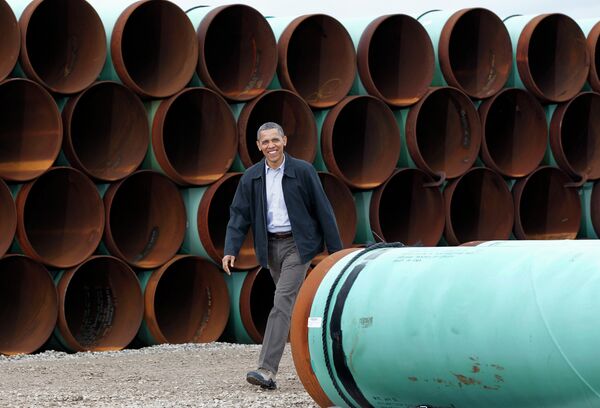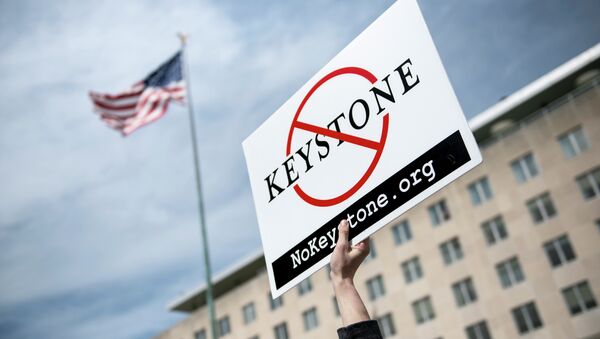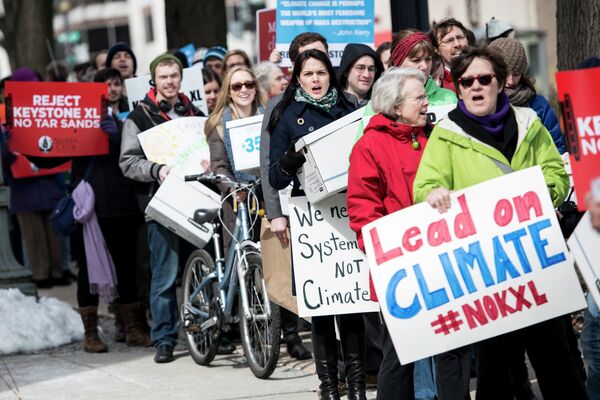"Conservation and landowners groups filed the opening brief today in their federal lawsuit challenging the Trump administration’s illegal approval of the Keystone XL tar sands pipeline. The groups are suing the Army Corps of Engineers over its failure to adequately analyse the project's effects on local waterways, lands, wildlife, and communities along its 1,200-mile route", the environmentalist group said in a press release on Friday.
Last November, a US federal court ruled that the Trump administration had failed to properly analyse such factors as the environmental impact of greenhouse gases and oil spills, as well as lacked concern for indigenous groups, when authorising TransCanada (TC) Energy, the Canadian owner of the Keystone oil pipeline system, to build the cross-border section.
Construction was then halted but a legal and political battle over the project continued. In August, the Nebraska Supreme Court removed one of the last barriers to the pipeline's construction, supporting the regulators' 2017 decision to authorise it.
In the opening brief, which is a written argument filed by an appellant with a court, the Sierra Club and other environmental groups are arguing that the Army Corps of Engineers violated several key environmental laws when it streamlined the permitting process for the oil pipelines by using the Nationwide Permit 12 (NWP 12), which allowed the Corps to bypass individual review of the projects.
"Pipeline spills are clearly inevitable, yet the Corps has fast-tracked pipeline construction and failed to ensure that Keystone XL and other pipelines won't devastate waters that people and species rely on. Keystone XL is an environmental nightmare waiting to happen, and we must continue to fight Trump's attempt to ram this dirty fossil fuel project down America's throat", Jared Margolis, a senior attorney with the Center for Biological Diversity, said, as quoted in the press release.
In his comment, Margolis referred to an oil spill in the US state of North Dakota in late October, where an estimated 383,000 gallons of oil leaked out. State regulators have said that about 209,100 square feet of land have been contaminated by the leak, which is almost 10 times the original estimate.
Keystone is an oil pipeline system that moves Alberta crude oil from the Canadian town of Hardisty to refineries and tank farms in the US states of Illinois, Oklahoma, and Texas. The first three phases of the system are currently operational, however, the construction of the fourth phase, better known as Keystone XL, that planned to transport oil to Nebraska, has caused a major uproar.
The proposed section of the pipeline is planned to originate in Hardisty, pass through Baker, Montana where US-produced oil from the Bakken Formation would be added to it, and eventually terminate in Steele City in Nebraska from where it would be redistributed to other refineries and tank farms.

The pipeline has drawn the ire of environmentalists, landowners, and indigenous groups who argue that the pipeline threatens the sensitive ecosystem through which it would traverse and that disasters like the 29 October leak would become commonplace.
Calgary-based TC Energy has said that the $8 billion pipeline would create thousands of jobs and be a boon to long-term US energy independence. The project also enjoys the support of Trump, who has avidly advocated for the expedited approval of the project.



